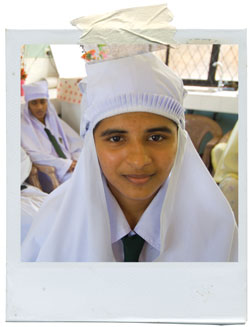


Ensure girls have the same access to schooling as boys by 2015.
The first target set in 2000 was to eliminate gender disparity in primary education preferably by 2005, and in all levels of education by 2015. But 41 million girls remain out of primary school.
In secondary schooling, most countries are also not closing the gender gap. In Africa the ratio of girls to boys enrolled actually FELL from 82 percent in 1999 to 79 percent in 2007.
Less than a third of countries have achieved equal access to secondary education – when it comes to tertiary education it’s even less - 6 percent.
Too few women still have decent employment which is fairly paid. In South Asia, 64 percent of women receive no pay for their work and in Africa few work outside of agriculture. Since 2008, the global financial crisis has created an estimated 10 to 22 million extra jobless women.
The growth of women’s political representation has been slow in much of the world. In 2009, an average of 18 percent of parliamentary seats were held by women, with a quarter of parliaments having less than 10 percent women. Some have none. Even in France, only 20 percent of parliamentarians are women.
There has been some progress. In 15 front running countries, 30 percent or more of seats are now occupied by women. In Latin America and the Caribbean there are more women in parliament than in 2000, and for the first time in 2009, 4 women won seats in Kuwait.

Nisa Gul wanted to go to school so much, she cried. For the first nine years of her life, there had been no school in Nisa's remote village in Afghanistan’s Herat region but now a team from American Caritas member Catholic Relief Services had arrived to start one. Nisa begged to be allowed to go. Unlike some Afghan men who do not believe in educating girls, Nisa's father said that she could: it was her mother who said no - "education is useless for girls!”
Forty-five year old Bibi Gul is herself illiterate and told Nisa that if she went she would be too busy doing her homework to help around the house. Nisa promised her mother that she would still do her chores and eventually, Bibi Gul reluctantly agreed.
The project establishes community-based classes and schools in village buildings and even in tents, in remote rural areas of Afghanistan. Books and blackboards are brought in and teachers - especially women ones - are trained. By bringing school close to home, and in some communities creating schools just for girls, the project has allowed thousands of girls equal access to education.
When a "library in a box" arrived, Nisa brought home one of the new books to read to her family. Maybe it was the title - "Respect your Mothers" which helped – or maybe it was watching her daughter do something she herself could not do, but Bibi Gul had a change of heart. "Now I know education is useful for everyone" she says.
Nisa’s already made good friends with the teacher, a 45-year old woman called Zahara, who is one of the few women with some formal education from the days before the Taliban. Zahara is excited showing the girls how to write on their new slates on the first day. "Now we have one class, soon maybe it will be two or three and then the government says we can have a formal school here. It's wonderful."
Photos: (top) A new school for girls in Sri Lanka. David Snyder/Caritas, (below) Girls at school in Afghanistan. Augustinus Wibowo/Catholic Relief Services.
Reiterate commitments regarding parity and women’s rights in development policy and funding and advocate for equal pay for women in all societies.
Remove school fees and provide incentives for girls to attend school. Build schools closer to remote communities and recruit local women teachers. Equality requires women have access to education.
Support women’s organisations which promote greater opportunities for women in the workplace and encourage targeted public policy and governance to overcome inequality.
Legislate to increase women’s participation in parliament. In 2008, after safeguarding seats, Rwanda became the first country with more than 50 percent of female-held seats.
Continue working to change attitudes and cultural practices, such as keeping girls at home and early marriage.